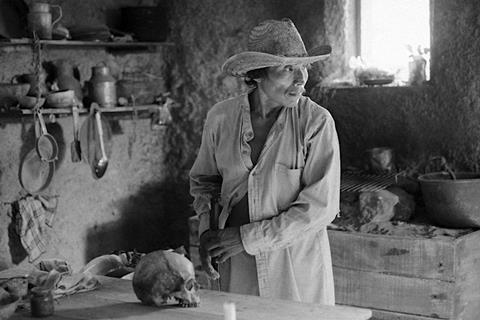The burgeoning relationship of a sixtysomething couple crosses Mexico’s cultural divide

Dir: Germinal Roaux. Switzerland/France/Mexico. 2024. 153mins
Set at the opposite end of the age spectrum to his Berlinale Crystal Bear-winning Fortuna (2014) Germinal Roaux’s gradually unfolding tale of unexpected connection between two sixtysomethings continues to demonstrate the Swiss director’s talent for polished and contemplative black and white slow-burn drama. The plot may be straightforward, but this allows more time to appreciate his carefully crafted visuals.
Polished and contemplative black and white slow-burn drama
Premiering in Thessaloniki’s Open Horizons, Cosmos has enough art house appeal to woo more dates on the festival circuit, although its lowkey nature might hinder its chances of theatrical release. A specialist streamer seems most likely further along the line.
When it comes to the cosmos of the film, Roaux’s protagonists inhabit two separate spheres. Leon (first-time actor Andres Catzin) is Mayan and, in a character set that drifts towards stereotype, poor in terms of material possessions but spiritually rich, feeling a connection to those who have gone before. His world is about to literally come crashing down, as his spartan home faces being demolished to make way for a highway.
Lena (veteran Spanish star Angela Molina) is a Mexican well-to-do widow rattling around an ancestral-style home with just her dog Bruno for company. Her world is also coming to the ultimate full stop as she reaches the final stage of an unnamed illness. “I need to be alone,” she tells people, when in fact the opposite is true. Leon and Lena’s lives intersect when Bruno goes missing and Leon finds him, leading to an increasingly warm friendship.
Light is the third main character in Roaux’s film, shifting and textured in all its forms – from a blazing tree to appealing sun spots. Roaux also employs the 1.33:1 boxy academy ratio to unusual effect. While in many films it feels claustrophobic and uncomfortable, the way in which the Mexican landscape and high ceilings of Lena’s home stretch out of the frame instead emphasise the unconstrained nature of the environment the pair inhabit and bring a feeling of possibility.
A rich soundscape adds to the strong sense of place, from the humming of insects and birdsong to dogs, a distant railroad and the sound of wind. It further bolsters the sense of life outside the frame, such as when the general hustle and bustle of a town can be heard as the camera focuses on Leon as he takes a bus journey.
The actors’ differing levels of professional experience works well in terms of the characters they are portraying – with Molina’s Lena much more confident and taut against Catzin’s quieter and looser Leon. Yet there’s a niggling sensation that this is too much of a one-way street in favour of Leon’s character serving Lena’s spiritual development. There are early hints that Roaux might examine the power discrepancy that exists between Leon, who is of indigenous descent, and Lena, who is not, but these are quickly swept away, making Leon’s generosity of spirit seem almost too good to be true.
While the acts of care between the characters are believable, the lack of articulation around Leon’s motivation for caring for Lena means the emotional pay-off carries less weight than it might. Roaux’s visuals are so immersive, however, that the appeal of Cosmos rests as much in appreciation of each moment as on its narrative journey.
Production companies: Close Up Films, Cinevinay, Nour Films
International sales: Close Up Films, info@closeupfilms.ch
Producers: Joëlle Bertossa, Flavia Zanon, Sandino Saravia Vinay, Patrick Sibourd
Cinematography: Germinal Roaux, Inti Briones
Art direction: Rekha Musale
Editing: Damian Plandolit
Music: Nicolas Rabaeus
Main cast: Angela Molina, Andres Catzin





















